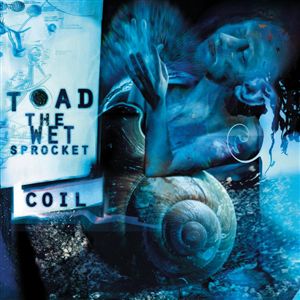Like most alterna-rockers, Toad The Wet Sprocket never professed to desiring superstardom, which isn’t exactly a lie. Having seen what fame could do to rock icons, any aspirant would tread carefully toward such a goal, but at the same time, the nature of record contracts dictated that a band would either make piles of money or end up owing the label the same amount, so a hit was always preferable. And while Dulcinea wasn’t exponentially more successful than Fear, they managed to hold onto their old fans and maintain a level of success that would allow for another album. (In Light Syrup kept them fresh in the racks, too.)
With its twisted, David Fincher-esque artwork and deep colors, Coil is often called a “dark” album, and it is, but it’s no less happy-go-lucky than any of their others. Overall it’s more direct, more assured, certainly louder, less precious, though Glen Phillips was certainly still performing barefoot.
That acoustic strumming so beloved by Dave Matthews and so many other bands of the time underpins “Whatever I Fear”, though the lead vocal (and Todd Nichols’ harmonies on the chorus) are pure Toad. Just as pure Toad is first single “Come Down”, which has two of the band’s favorite title words as well as a killer chorus and hooks aplenty, neither of which guaranteed airplay on an already confused platform. “Rings” has chordal qualities that recall their earlier albums, except that they’re played a lot harder, and it would seem the words are sung from the point of view of a tree? “Dam Would Break” offers more of that earnest acoustic strumming so iconic of the bands who didn’t play grunge in the era of the same, plus a neat metaphor and wordless chorus. Todd gets to shred to his heart’s content on “Desire”, the closest they get to “funky”, or even “dirty”, and while “Don’t Fade” starts and ends quietly (comparatively, for this album) there’s still a ton of aggression in the band’s delivery.
“Little Man Big Man” presents a basic summary of human nature, and possibly the nature of warfare, in a catchy, low-key structure with clever use of acoustics. Another should-have-been-classic, “Throw It All Away” is one of those songs that sounds like so many others, but in a good way. It’s uplifting, has great harmonies, and sends a seemingly simple message to go along with the basic chords. The feeling is short-lived, as “Amnesia” turns up the volume (and anger) again over the Holocaust and other genocides. “Little Buddha” is an odd one; in addition to its Van Dyke Parks string arrangement, it takes a long time to say very little, the crux of which is “life is suffering, tee-hee, ha-ha.” Which makes “Crazy Life”, sung by Todd, a nice addition. It’s here in a slightly remixed form than its original appearance on the Empire Records soundtrack, which beat In Light Syrup to the shelves by a month, and while it would fit thematically on that album, it provides a certain sunlight here. It’s also a good setup for the wistful benediction of “All Things In Time”, which also ensures that another favorite title word is included.
The louder, harder Toad as displayed on Coil may have put a few fans off, but it’s still a logical progression. For newcomers, it helped separate them from “nice” bands like Hootie & The Blowfish, but as far as the charts were concerned, they were both in the same pile of CDs headed for the used bin.
Toad The Wet Sprocket Coil (1997)—3½

No comments:
Post a Comment